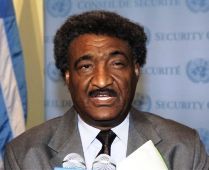Sudan still disagrees on detail of Darfur force
Nov 17, 2006 (ADDIS ABABA) — Sudan has for the first time accepted the principle of U.N. troops going into Darfur to help end one of the world’s worst humanitarian crises, but there are still significant disagreements over the shape of the force.
 “It is agreed in principle that, pending clarification of the size of the force, we should be able to take it forward,” U.N. Secretary-General Kofi Annan said late on Thursday at the end of a major diplomatic meeting on Darfur in Addis Ababa.
“It is agreed in principle that, pending clarification of the size of the force, we should be able to take it forward,” U.N. Secretary-General Kofi Annan said late on Thursday at the end of a major diplomatic meeting on Darfur in Addis Ababa.
“The troops should be sourced from Africa as far as possible and the command and control structure would be provided by the U.N.,” he said, adding the force would consist of 17,000 troops and 3,000 police.
The outgoing U.N. chief convened the meeting to try to resolve one of the most intractable crises of his tenure, in which an overstretched and underfunded African Union (AU) force has been unable to end bloodshed in the huge Sudanese region.
But it was clear there was some way to go before the force could be deployed, with Khartoum still not agreeing on either its size or any U.N.-African Union joint command.
Sudan’s U.N. ambassador Abdalmahmood Abdalhaleem Mohamad told reporters after the meeting: “Peacekeepers will be African, the U.N. will give logistical support.
“If you have a predominantly African force, then you expect to it to be led by an African commander.”
He also expressed disagreement over the size of the force. “The U.N. says 17,000 (troops), that figure is very high. We think 11,000 to 12,000.”
The Darfur fighting has spilled over into both Chad and Central African Republic (CAR).
Chad Prime Minister Pascal Yoadimnadji said on Friday N’Djamena planned to send troops to CAR to help it fight cross-border rebels backed by Khartoum.
MOBILISATION
He called for a general mobilisation of Chad’s population to fight a “war imposed by Sudan.”
U.S. President George W. Bush welcomed the Addis Ababa agreement which he said paved the way for a U.N.-funded joint peacekeeping force composed primarily of African troops.
The West has pushed hard for a substantial U.N. force to end three years of war, rape and pillage in Darfur that have killed 200,000 people and driven 2.5 million from their homes.
But the repeated rejection of this idea by Sudanese President Omar Hassan al-Bashir led to new proposals for a “hybrid” alternative in which the United Nations would boost the 7,000-strong AU force.
The depth of the crisis was underlined on Thursday when U.N. humanitarian chief Jan Egeland cut short a planned three-day trip to Darfur after government officials said all the areas he wanted to visit were too dangerous.
He said it was clear neither the government nor the AU force was able to protect civilians in Darfur, where violence was at its worst since it began in early 2003.
“It’s a protection crisis among the worst in the world,” he said after visiting victims at the hospital in el-Geneina, capital of West Darfur.
“Civilians are not being defended against armed, terrible, gruesome men who attack women and children.”
Egeland and journalists accompanying him saw badly wounded victims of the violence and heard gruesome stories of militia targeting women and children. Survivors said the attackers were Arab Janjaweed militia, who have been armed by Khartoum.
The Sudanese envoy said in Addis Ababa that government officials would respond to the latest proposal before the AU Peace and Security Council meets on Nov. 24 to discuss Darfur.
“We all agreed to have a good political process for any peacekeeping to proceed,” he told reporters.
The AU force mandate expires on Dec. 31.
On his farewell trip to Africa, Annan summoned officials from the U.N. Security Council’s permanent members, the European Union, Egypt, Gabon and the Arab League to Thursday’s talks.
The AU also invited Libya, Nigeria, Rwanda, Senegal and South Africa.
Experts say since one of three Darfur rebel factions signed a peace agreement in May the violence has increased. Diplomats said AU and U.N. officials will meet rebels who did not sign the peace deal in the next two weeks.
(Reuters)
